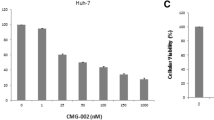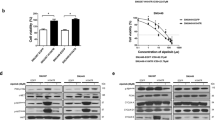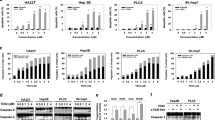ABSTRACT
Background
Effective therapeutic combinations targeting the oncogenic pathway still are unknown in human hepatocellular carcinoma (HCC). The authors previously identified aberrant expression of aurora B kinase as the independent predictor for the lethal recurrence of HCC, showing that AZD1152 induced in vitro and in vivo apoptosis with polyploidy in human HCC cells. In this preclinical study, the combined effects of molecular-targeted therapies were evaluated based on the cellular response of aurora B inhibition.
Methods
This study analyzed the expression of Bcl-2 family proteins in polyploidization induced by AZD1152 and the in vitro synergistic effects of AZD1152 with control of the Bcl-2 family pathway in human HCC cells. The in vivo effects of the combination therapy targeting the specific molecules were evaluated using subcutaneous tumor xenograft models.
Results
The findings showed that Bcl-xL was specifically overexpressed in AZD1152-induced polyploid HCC cells. The combination of AZD1152 followed by Bcl-xL/2 inhibitor ABT263 induced synergistically cellular apoptosis (p < 0.001) and growth inhibition (p < 0.0001). Interestingly, the reverse sequential administration of AZD1152 combined with pretreatment of ABT263 was less effective than the original one. In vivo studies using tumor xenografts of human HCC cells showed that combination therapy of ABT263 after AZD1152 pretreatment induced significant intratumoral apoptosis (p < 0.05) and remarkable anti-tumor effects (p < 0.05) without a severe adverse effect compared with the monotherapy.
Conclusion
Based on Bcl-xL overexpression in polyploidy induced by aurora B inhibition, the rationale for therapeutic combinations targeting aurora B and Bcl-xL was demonstrated in the authors’ preclinical studies, leading to a promising novel approach for the mechanism-based treatment of human HCC.





Similar content being viewed by others
References
Forner A, Llovet JM, Bruix J. Hepatocellular carcinoma. Lancet. 2012;379:1245–55.
Sherman M. Recurrence of hepatocellular carcinoma. N Engl J Med 2008; 359: 2045–2047.
Arii S, Sata M, Sakamoto S, Shimada M, Kumada T, Shiina S, et al. Managemant of hepatocellular carcinoma: report of Consensus Meeting in the 45th Annual Meeting of the Japan Society of Hepatology (2009). Hepatol Res. 2010;40:667–85.
Tanaka S, Noguchi N, Ochiai T, Kudo A, Nakamura N, Ito K, et al. Outcomes and recurrence of initially resectable hepatocellular carcinoma meeting Milan criteria: rationale for partial hepatectomy as first strategy. J Am Coll Surg. 2007;204:1–6.
Wrzesinski SH, Taddei TH, Strazzabosco M. Systemic therapy in hepatocellular carcinoma. Clin Liver Dis. 2011;15:423–41.
Sawyers C. Targeted cancer therapy. Nature. 2004;432:294–7.
Yap TA, Omlin A, de Bono JS. Development of therapeutic combinations targeting major cancer signaling pathways. J Clin Oncol. 2013;31:1592–605.
Llovet JM, Ricci S, Mazzaferro V, Hilgard P, Gane E, Blanc JF, et al. Sorafenib in advanced hepatocellular carcinoma. N Engl J Med. 2008;359:378–90.
Tanaka S, Arii S. Molecular targeted therapies in hepatocellular carcinoma. Semin Oncol. 2012;39:486–92.
Hemandez-Gea V, Toffanin S, Friedman SL, Llovet JM. Role of the microenvironment in the pathogenesis and treatment of hepatocellular carcinoma. Gastroenterology. 2013;114:512–27.
Marquardt JU, Thorgeirsson SS. SnapShot: hepatocellular Carcinoma. Cancer Cell. 2014;25:550–550.
Tanaka S, Arii S, Yasen M, Mogushi K, Su NT, Zhao C, et al. Aurora kinase B is a predictive factor for the aggressive recurrence of hepatocellular carcinoma after curative hepatectomy. Br J Surg. 2008;95:611–9.
Aihara A, Tanaka S, Yasen M, Matsumura S, Mitsunori Y, Murakata A, et al. The selective aurora B kinase inhibitor AZD1152 as a novel treatment for hepatocellular carcinoma. J Hepatol. 2010;52:63–71.
Carvajal RD, Tse A, Schwartz GK. Aurora kinases: new targets for cancer therapy. Clin Cancer Res. 2006;12:6869–75.
Ruchaud S, Carmena M, Eamshaw WC. Chromosomal passengers: conducting cell division. Nat Rev Mol Cell Biol. 2007;8:798–812.
Nicholas K, Stephen T. Aurora-kinase inhibitors as anticancer agents. Nat Rev Cancer. 2004;4:927–36.
Vogel C, Hager C, Bastians H. Mechanism of mitotic cell death induced by chemotherapy-mediated G2 checkpoint abrogation. Cancer Res. 2007;67:339–45.
Minn AJ, Boise LH, Thompson CB. Expression of Bcl-xL and loss of p53 can cooperate to overcome a cell cycle checkpoint induced by mitotic spindle damage. Genes Dev. 1996;10:2621–31.
Shen YJ, DeLong CJ, Tercé F, Kute T, Willingham MC, Pettenati MJ, Cui Z. Polyploid formation via chromosome duplication induced by CTP: phosphocholine cytidylyltransferase deficiency and Bcl-2 overexpression: identification of two novel endogenous factors. J Histochem Cytochem. 2005;53:725–33.
Shah OJ, Lin X, Li L, Huang X, Li J, Anderson MG. et al. Bcl-XL represents a druggable molecular vulnerability during aurora B inhibitor-mediated polyploidization. Proc Natl Acad Sci USA. 2010;107:12634–9.
Tsujimoto Y. Cell death regulation by the Bcl-2 protein family in the mitochondria. J Cell Physiol. 2003;195:158–67.
Casredo M, Perfettini JL, Roumier T, Andreau K, Medema R, Kroemer G, et al. Cell death by mitotic catastrophe: a molecular definition. Oncogene. 2004;23:2825–37.
Roulston A, Muller WJ, Shore GC. BIM, PUMA, and the achilles’ heel of oncogene addiction. Sci Signal. 2013;6(268):pe12.
Hikita H, Takehara T, Shimizu S, Kodama T, Shigekawa M, Iwase K, et al. The Bcl-xL inhibitor, ABT-737, efficiently induces apoptosis and suppresses growth of hepatoma cells in combination with sorafenib. Hepatology. 2010;52:1310–21.
Tanaka S, Pero SC, Taguchi K, Shimada M, Mori M, Krag DN, et al. Specific peptide ligand for Grb7 signal transduction protein and pancreatic cancer metastasis. J Natl Cancer Inst. 2006;98:491–8.
Oltersdorf T, Elmore SW, Shoemaker AR, Armstrong RC, Augeri DJ, Belli BA, et al. An inhibitor of Bcl-2 family proteins induces regression of solid tumors. Nature. 2005;435:677–81.
Wilson WH, O’ Connor OA, Czuczman MS, LaCasce AS, Gerecitano JF, Leonard JP, et al. (2010) Navitoclax, a targeted high-affinity inhibitor of BCL-2, in lymphoid malignancies: a phase 1 dose-escalation study of safety, pharmacokinetics, pharmacodynamics, and antitumour activity. Lancet Oncol. 11:1149–59.
Ferrara N, Gerber HP, LeCouter J. The biology of VEGF and its receptors. Nat Med. 2003;9:669–76.
Citri A, Yarden Y. EGF-ERBB signaling: towards the systems level. Nat Rev Mol Cell Biol. 2006;7:505–16.
Laplante M, Sabatini DM. mTOR signaling in growth control and disease. Cell. 2012;149:149–93.
Lapenna S, Giordano A. Cell cycle kinases as therapeutic targets for cancer. Nat Rev Drug Discov. 2009;8:547–66.
Raymond E, Alexandre J, Faivre S, Goldwasser F, Besse-Hammer T, Gianella-Borradori A, et al. A phase I schedule dependency study of the aurora kinase inhibitor MSC1992371A in combination with gemcitabine in patients with solid tumors. Invest New Drugs. 2014;32:94–103.
Villanueva A, Llovet JM. Targeted therapies for hepatocellular carcinoma. Gastroenterology. 2011;140:1410–26.
Finn RS. Emerging targeted strategies in advanced hepatocellular carcinoma. Semin Liver Dis. 2013;33:S11–9.
Lachenmayer A, Alsinet C, Chang CY, Llovet JM. Molecular approaches to treatment of hepatocellular carcinoma. Dig Liver Dis. 2010;42:S264–72.
Finn RS, Poon RT, Yau T, Klümpen HJ, Chen LT, Kang YK, et al. Phase I study investigation everolimus combined with sorafenib in patients with advanced hepatocellular carcinoma. J Hepatol. 2013;59:1271–7.
Zhu AX, Abrams TA, Miksad R, Blaszkowsky LS, Meyerhardt JA, Zheng H, et al. Phase 1/2 study of everolimus in advanced hepatocellular carcinoma. Cancer. 2011;15:5094–102.
Thomas MB, Morris JS, Chadha R, Iwasaki M, Kaur H, Lin E, et al. Phase II trial of the combination of bevacizumab and erlotinib in patients who have advanced hepatocellular carcinoma. J Clin Oncol. 2009;27:843–50.
Rudin CM, Hann CL, Garon EB, Ribeiro de Oliveira M, Bonomi PD, Camidge DR, et al. (2012) Phase II study of single-agent navitoclax ABT-263 and biomarker correlates in patients with relapsed small cell lung cancer. Clin Cancer Res. 18:3163–9.
Weinstein IB, Joe AK. Mechanisms of disease: oncogene addiction: a rationale for molecular targeting in cancer therapy. Nat Clin Pract Oncol. 2006;3:448–57.
Petricoin EF III, Bichsel VE, Calvert VS, Espina V, Winters M, Young L, et al. Mapping molecular networks using proteomics: a vision for patient-tailored combination therapy. J Clin Oncol. 2005;15:3614–21.
Acknowledgment
We thank AstraZeneca for kindly providing us with AZD1152 and AZD1152-HQPA for experimental studies. We also thank Drs. Andrew Foxley and Kate Owen (AstraZeneca) for their helpful review of our manuscript. This work was supported by Grant-in-Aid for Scientific Research on Innovative Areas; Scientific Research (A) from the Ministry of Education, Culture, Sports, Science & Technology of Japan; and a Health & Labour Sciences Research Grant from the Ministry of Health Labour & Welfare of Japan.
Disclosure
Hiroko Matsunaga, Shinji Tanaka, Arihiro Aihara, Kousuke Ogawa, Satoshi Matsumura, Daisuke Ban, Takanori Ochiai, Takumi Irie, Atsushi Kudo, Noriaki Nakamura, Shigeki Arii and Minoru Tanabe declare that they have no conflicts of interest.
Author information
Authors and Affiliations
Corresponding author
Electronic supplementary material
Below is the link to the electronic supplementary material.
Rights and permissions
About this article
Cite this article
Matsunaga, H., Tanaka, S., Aihara, A. et al. A Novel Therapeutic Combination Sequentially Targeting Aurora B and Bcl-xL in Hepatocellular Carcinoma. Ann Surg Oncol 22, 3079–3086 (2015). https://doi.org/10.1245/s10434-014-4292-3
Received:
Published:
Issue Date:
DOI: https://doi.org/10.1245/s10434-014-4292-3




